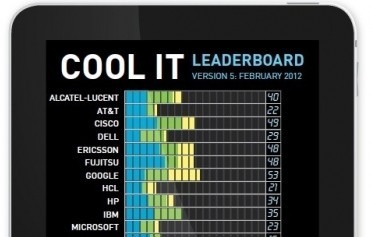
Just as the power of the internet has revolutionised our communication by allowing users to provide content such as video, music and text material, generating new producers, journalists and authors, IT energy-related "smart" solutions have the ability to put consumers in command of their electricity use and pave the way for dramatic improvements in energy efficiency and use of renewable energy.
Greenpeace's own [E]nergy Revolution blueprint, which outlines a sustainable pathway for a transition to having 95 percent of global energy needs met by renewable energy by 2050, a significant disruption of the centralised dirty energy business model by ICT technologies is essential to achieving this goal.
In order to encourage IT firms to push towards cleaner operations, Greenpeace has been running its Cool It Leaderboard for the last five years. “Pitching global IT companies against each other to find who comes out top in the fight to stop climate change, the fifth edition of the leaderboard compares the firms on their climate solutions, energy impact and political advocacy,” explains Gary Cook, an IT analyst for Greenpeace International.
According to Cook, “he tussle for the top of our Cool IT leaderboard has taken its latest twist, with Google grabbing the top spot ahead of 20 other technology companies, including Cisco and Ericsson” in this year’s Leaderboard.
According to Greenpeace, Google is way ahead on climate solutions and energy impacts, thanks to its disclosure of its energy footprint, and for providing its impressively detailed mitigation plan for achieving emissions reductions. On top of this, Google continues to speak up on important climate change policies, and make its voice heard on the immediate need for both US and EU governments to aggressively cut emissions.
Google, along with Cisco and Dellalso stand out for sourcing over 20 percent renewable energy globally for each company's infrastructure.
Cisco, Ericsson, and Fujitsu stand out once again in the solutions criteria for providing detailed case studies of how their unique technology is creating pathways towards significant emission reductions, while Softbank has set a new bar in advocacy leadership with strong statements and efforts to move Japan away from dirty energy dependence post-Fukushima.
Louder voice needed
Unfortunately, Greenpeace reveals that there was a notable drop in scores on political advocacy across the industry. “With the urgent need for cuts in global greenhouse gas emissions, tech firms are failing to speak up against those dirty energy companies guilty of stalling climate change policy debates at all levels of government. This is troubling: the IT industry is full of environmental rhetoric but simply doesn’t seem to be taking any real action. This is not tenable: the industry is expanding too fast, and has too much potential for helping cut global emissions to just stand in the shadows,” says Cook.
Several companies also dropped points for pushing vague plans to mitigate their climate footprint, and for the lack of any plans for powering their future data centres with renewable energy. To remedy these problems, companies need to become more transparent on their investments into IT solutions that work to mitigate climate change and future emissions savings goals.
However, with the possibility of introducing new climate solutions and expanding into emerging markets such as India, the tech business has an opportunity to create a greater demand for renewable energy that will ripple into other parts of the economy. The industry’s energy footprint is growing, and with so many new communities gaining access to mobile phones, tablets, and green building techniques that use innovative IT technology, it won’t be decreasing anytime soon.
In fact, in the Smart 2020 report released nearly four years ago, it was projected that the internet’s energy consumption will triple by 2020. But the sector can actually make a dent in global emission cuts in that same time frame by contributing to clever climate solutions by allowing people to measure their electricity consumption. While it is exciting to see the leadership by some of the companies on the leaderboard, like Google, it is disappointing that the industry as a whole is failing to fulfil its potential.
[Inset: Courtesy of Greenpeace]
For additional information:

